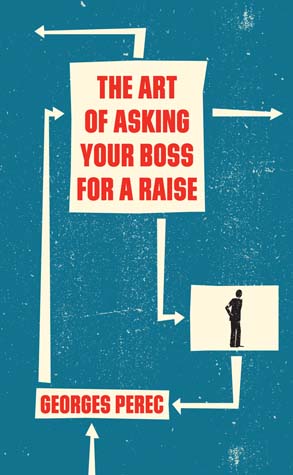
Published by Verso, 2011 | 96 pages
Georges Perec’s The Art of Asking Your Boss for a Raise is a 78-page rabbit hole of a novel. Written in 1968 and algorithmically structured – with accompanying flowchart, designed by Jacques Perriaud at the Computing Service of the Humanities Research Centre in Paris, and included in the text’s inside and back covers – The Art of Asking takes the reader through various possible steps an employee - “you," in the work's second-person narration - could take to meet with “your” boss, “mr x,” to discuss a raise.
Born in 1936, Georges Perec was orphaned early in life. Polish Jews who emigrated to Paris in the 1920s, he lost his parents early in life: his father killed while serving in the French army in 1940, his mother a victim of the Holocaust in 1943. Perec was subsequently adopted and raised by an aunt and uncle. In his maturity he was a member of the Oulipo (Ouvroir de Littérature Potentille, Workshop for Potential Literature), a loose gathering of French-speaking writers and mathematicians focused on various practices of literary constraint, including “the snowball,” a form of poetry where each line is a single word and each successive word is one letter longer, and the “lipogram,” a constraint that excludes the use of one or more letters. Perec’s most renown work in the Oulipolian style is the novel, Verba Mundi (The Void), a lipogram that never once utilizes the letter “e.”
An obviously significant formal aspect of The Art of Asking Your Boss for a Raise is the work's flowchart structure. At the beginning of the algorithm we find the protagonist walking by mr x’s office to see if he is in. As he, in most cases, is not there, “you” are instructed to “circumperambulate the various departments which taken together constitute the whole or part of the organization of which you are an employee...” Variations of this line recur throughout the text, reiterating the protagonist’s growing sense of frustration and futility. The last part of the line, “...of which you are an employee...” is replaced in turn with “...of which you are an exploitee...” “...that toys with you...” “of which you are obviously not the brightest star...” “...which pays you a pittance while grinding away the best years of your life...” and so on.
Also noteworthy here is the complete lack of punctuation and capitalization. David Bellos, The Art of Asking's translator, perceptively notes in his introduction that while Perec was enthralled with “the exhaustive contemplation of self-devised schemes and grids,” he sought, via his refrain from the use of punctuation, to communicate a story that “speaks to us in the end of entropy and human mortality.” The Art of Asking is indeed accordingly a succession of looping if/then statements best effected via the “you” address of the work, which directly implicates the reader in the “existential” frustrations of the “you” protagonist’s Kafkaesque position.
Over its course, this story/equation surrealistically explores the possible ways of dealing with other various situations, such as a measles outbreak, food poisoning resulting from expired eggs, the likelihood of choking on a fishbone if it does or does not happen to be during Lent and does or does not occur on a Friday, etc. These possibilities likewise develop the algorithm into further corresponding actions and subsequent possibilities then contingent upon other possibilities, until the sum total comes to resemble in spirit the works of Camus or Malraux.
As with much formally experimental art, the self-imposed confinements can at times hinder the experience itself. However, Perec’s subtle illustration of the application of a rigid logic to human administration - realized via the work’s labyrinthine structure, lack of punctuation and repetition of lines - produces from within a powerful representation of societal entropy. Maddening, perhaps, while simultaneously bizarre and familiar, The Art of Asking Your Boss for a Raise is a journey into the heart of (bureaucratic) darkness.
SD Allison was born in Nebraska. He is the descendant of farmers, teachers, and men with bad lungs. He is the father of a little boy with autism. His first novel, Beneath the Plastic, was published in 2006.















click to see who
MAKE Magazine Publisher MAKE Literary Productions Managing Editor Chamandeep Bains Assistant Managing Editor and Web Editor Kenneth Guay Fiction Editor Kamilah Foreman Nonfiction Editor Jessica Anne Poetry Editor Joel Craig Intercambio Poetry Editor Daniel Borzutzky Intercambio Prose Editor Brenda Lozano Latin American Art Portfolio Editor Alejandro Almanza Pereda Reviews Editor Mark Molloy Portfolio Art Editor Sarah Kramer Creative Director Joshua Hauth, Hauthwares Webmaster Johnathan Crawford Proofreader/Copy Editor Sarah Kramer Associate Fiction Editors LC Fiore, Jim Kourlas, Kerstin Schaars Contributing Editors Kyle Beachy, Steffi Drewes, Katie Geha, Kathleen Rooney Social Media Coordinator Jennifer De Poorter
MAKE Literary Productions, NFP Co-directors, Sarah Dodson and Joel Craig